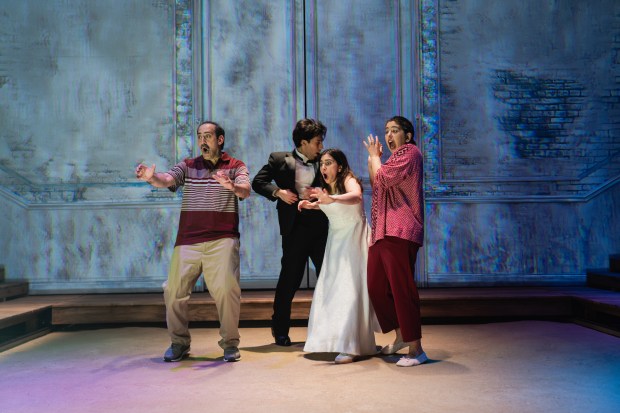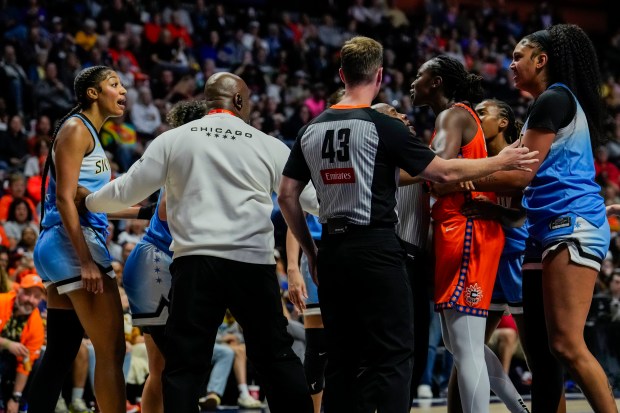INDIANAPOLIS — Abbey Weitzeil will take on some new responsibilities at the Paris Olympics.
Leader. Mentor. A shoulder to cry on.
Weitzeil will head to her third Summer Games with only one chance to swim, and not on her own. She’ll be part of the 4×100-meter freestyle relay, possibly relegated to a spot in the morning preliminaries, far removed from the spotlight of the evening finals she’s so used to.
“It’s definitely a different role,” she told The Associated Press in a hallway at Lucas Oil Stadium, looking for the bright side to a U.S. Olympic trials that didn’t live up to expectations. “Just taking on my role as a veteran, ready to lead these women with fun, with experience, with anything they need.”
Weitzeil failed to qualify for an individual event during the meet in Indianapolis, finishing fifth in the 100 freestyle and a heartbreaking third in the 50 free. Only the top two in each event get to swim individually at the games.
She missed out by less than a second — a total of 0.88, to be exact — in her two frantic sprints.
It was a bitter disappointment for the 27-year-old Californian, a longtime stalwart of the national team.
But she’s trying to make the best of it, knowing what an accomplishment it is to call herself a three-time Olympian.
“This meet has been a crazy whirlwind of emotions for me, watching people make their first Olympic team that I know, watching teammates make their first Olympic team, watching people not make the team,” Weitzeil said.
Weitzeil’s journey to Paris Games
Indeed, the road to Paris took some cruel twists and turns in Indy.
Just ask Lydia Jacoby, a shocking gold medalist three years ago who didn’t even make the U.S. team this time around. Or Claire Curzan, who won four golds and six medals overall at the world championships in February but won’t be going to the Olympics.
Weitzeil felt some of that same sting, but the relay gave her a safety net.
“At every trials that I’ve come to, I’ve seen the ‘1’ or the ‘2’ next to my name,” she said. “So, it’s definitely something that took me aback. It took me a day to, you know, be frustrated, be sad, be excited for myself, be proud of myself. It took me a second to realize what I’ve done, that I’ve made a third Olympic team. That’s a great achievement, so I should be proud of myself.”
One of the things she’ll be able to pass along to the newbies is advice for coping with the Olympic Village, probably the most hectic spot at the games with some 10,000 world-class athletes crammed together for 2 1/2 weeks.
“People may think like, ‘Oh, you’re at the Olympics, people are treating you amazing, you’re getting five-star service,’” Weitzeil said with a smile. “It’s kind of the opposite. You’re staying in little rooms that aren’t finished. They’re just drywall pretty much. The beds are rock solid. You’re in a little twin bed. In Tokyo, the frames were made of cardboard. You’re walking a lot. You’re walking miles around the village. It’s pretty chaotic.”
At Weitzeil’s first Olympics in Rio, she didn’t find much to her liking in the dining hall. There was a McDonald’s in the village, “but the line was long all the time,” she recalled. “I didn’t eat much during those games.”
Now, she’s got more experiences to fall back on — knowledge she can pass on to any teammates who may be feeling a bit like a fish out of water at their first Olympics.
2024 Olympics: What to know — and who to watch — during the Summer Games in Paris
“Every Olympics is different,” Weitzeil said. “Some are set up really well, some are set up not so well. Navigating that is in itself its own beast.”
Weitzeil came into this Olympic cycle with one “big, big, big goal’ — to win an individual medal in Paris.
She has four medals in her career, including a gold, but all of them have come from relays.
At both the 2016 Rio de Janeiro Games and the pandemic-delayed Tokyo Games of 2021, Weitzeil qualified for both the 50 and 100 free. She advanced to the final three times, but never placed higher than seventh.
“People from the outside may see success as being medalist. It’s like, ‘Oh, you missed the podium, that sucks,’” Weitzeil said. “But it’s about finding success where it lies. I can look at myself — which took me a long time — and realize that I’ve been in this sport longer than a lot of people have. That’s a success in itself. I’ve had an amazing career. I need to appreciate that.”
Weitzeil’s coaching change during Olympic training
After the Tokyo Olympics, she had to cope with a jarring change.
Teri McKeever, her longtime coach at Cal-Berkeley, both through her college career and after she turned pro, was fired by the school over allegations that she bullied and harassed athletes.
Weitzeil won’t talk about McKeever’s downfall. She will only say that she was lucky to make a relatively smooth transition to the training group led by Cal men’s coach Dave Durden.
“Hearing that your coach is no longer going to be your coach came as a shock,” she said. “But I’ve found success in it. I think change can good for anyone, even if it’s something you didn’t expect.”
Weitzeil hasn’t said how long she plans to compete, but she’s already got some big plans away from swimming.
After returning from Paris, she’s getting married.
“This year is huge for me in such amazing ways,” Weitzeil said. “I think planning a wedding has been kind of like a gateway for me. I love that kind of stuff. I love organizing and all of that. It’s been something fun for me to do, and I’ve had a long time to do it, so no stress on that.”
She may never know why things didn’t quite work out the way she wanted at the pool this time around.
Sometimes, you do everything according to plan — and it’s still not enough.
“I think mentally I was ready to go. Physically, I was training so well,” Weitzeil said. “I haven’t seen it in the pool yet, so it’s a little frustrating.”
Hey, at least she will be in Paris.
Just in a different role.
“I feel like can offer some insight to the younger swimmers and be there as kind of a support system and help lead the team,” she said. “I’ve been on teams with people who were captains, people I looked up to, people who were comforting in uncomfortable situations.”
At the Olympics, Weitzeil added, “I want to be that for other people. I want to be someone they can come to when they’re nervous, lean on when they just want to hang out and take their mind off things. I’ve had that, and I want to offer that to people.”




